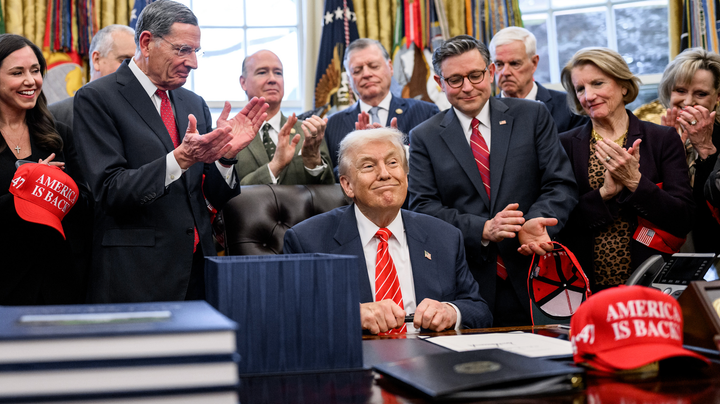US Appeals Court Restores Anti-Whistleblower 'Ag-Gag' Laws In Iowa
The appeals court decision was celebrated by Iowa Governor Kim Reynolds.

The following article was made possible by paid subscribers of The Dissenter. Become a subscriber and support independent journalism in defense of whistleblowers and press freedom.
A United States appeals court restored two “ag-gag” laws that were passed by the state of Iowa on behalf of the food and agribusiness industry. The laws have been condemned for suppressing journalism, whistleblowing, and freedom of speech.
Iowa Governor Kim Reynolds hailed the decision by the Eighth Circuit Court of Appeals in a statement shared with Farm Journal, a leading trade publication for U.S. agribusiness. “This is a win for both Iowans and the country. Iowa farmers feed and fuel the world and are an essential part of the global food supply chain.”
“No longer will people be able to gain access or employment to agricultural production facilities with the intent to cause physical injury or economic harm. We will always stand up for the security and safety of our farmers and their land,” Reynolds added.
The Animal Legal Defense Fund (ALDF), which previously convinced a lower court to declare two laws unconstitutional, expressed disappointment in a decision that supports “secrecy in industrial agriculture.”
According to ALDF attorney Caitlin Foley, “the decision undermines activists' ability to shed light on issues of animal cruelty, food safety, and workers' rights.” It also is “out of step” with other U.S. courts that have ruled against similar “ag-gag” laws.
Ag-gag laws are essentially anti-whistleblower farm secrecy statutes. Ten states have adopted such laws, however, numerous U.S. courts have sided with animal rights and press freedom groups and declared the laws unconstitutional.
In 2019, the U.S. District Court for the Southern District of Iowa ruled that the Iowa law, which established the crime of “agricultural production facility fraud,” criminalizes speech that inflicts no “specific harm” on property owners, “ranges very broadly,” and risks significantly chilling speech that is not covered under the statute.
The federal court acknowledged the fact that multiple lawmakers pushed for the passage of ag-gag laws to stop what they described as “subversive acts” by “groups that go out and gin up campaigns to give the agricultural industry a bad name.”
In 2022, the same court also ruled that an Iowa recording ban that explicitly designated audio or video recording as “trespassing” crimes was unconstitutional.
But the Eighth Circuit Court of Appeals overturned both decisions by the lower court.
Although the appeals court noted that the lower court had determined Iowa’s ag-gag laws were not appropriately neutral because they target “speakers with negative views of agricultural production facilities,” Circuit Judge Steven Colloton maintained that the Iowa law was no longer unconstitutional.
Iowa lawmakers in their view had corrected a key problem with the law by passing an “agricultural production facility trespass” statute later in 2019, which incorporated an intent requirement.
“The intent element determines whether particular conduct violates the statute, but it does not mean that a violation turns on the viewpoint of an offender’s deceptive speech,” Colloton stated. “Rather, the intent requirement permissibly reflects ‘the general view that criminal punishment should be reserved for those who intend the harm they commit.’”
“The statute filters out trespassers who are relatively innocuous, and focuses the criminal law on conduct that inflicts greater harm on victims and society. In our view, the Iowa statute is not a viewpoint-based restriction on speech, but rather a permissible restriction on intentionally false speech undertaken to accomplish a legally cognizable harm,” Colloton further concluded.
Whether an intent requirement makes the ag-gag laws constitutional on their face, it is difficult to believe that the state could ever apply the law without unfairly targeting whistleblowers, journalists, or activists, who threaten to expose industrial agriculture practices to public scrutiny.
The appeals court decision ignored the genesis of Iowa’s ag-gag laws. Iowa state senators like Ken Rozenboom supported the statutes as a necessary response to the “gravest threats to animal agriculture in Iowa.”
Rozenboom, who owned a factory farm, discussed how animal rights activists had investigated his business. He cheered the law for imposing a felony against animal rights activists who commit a repeat offense.
As Reporters Committee for Freedom of the Press (RCFP) and various other media organizations argued in their submission to the appeals court, “By imposing criminal penalties upon those who wish to disclose unsafe conditions or wrongdoing in agricultural facilities to the public—disclosures that could be expected to cause ‘economic harm or other injury to’ that business—[the ag-gag law] deters whistleblowers from coming forward to speak with members of the news media, ultimately stifling the flow of information to the public.”
No section of the decision addressed the issue of “economic harm” as outlined by Iowa lawmakers.
The appeals court judges also seemingly disregarded the concern that ag-gag laws chill “constitutionally protected speech by deterring communications from sources," who may want to disclose information to journalists about the facilities in which they work.
Both lawsuits now return to the lower court, and ALDF is expected to continue their challenge against the ag-gag laws.




Comments ()